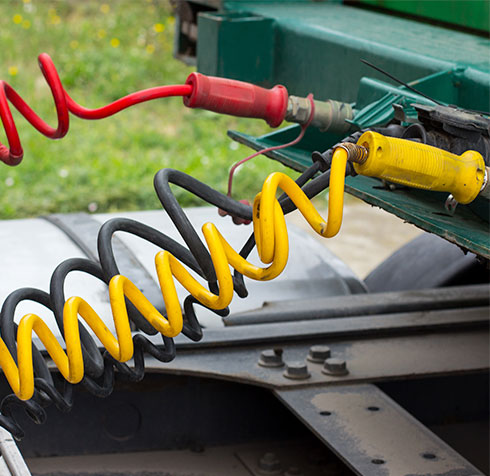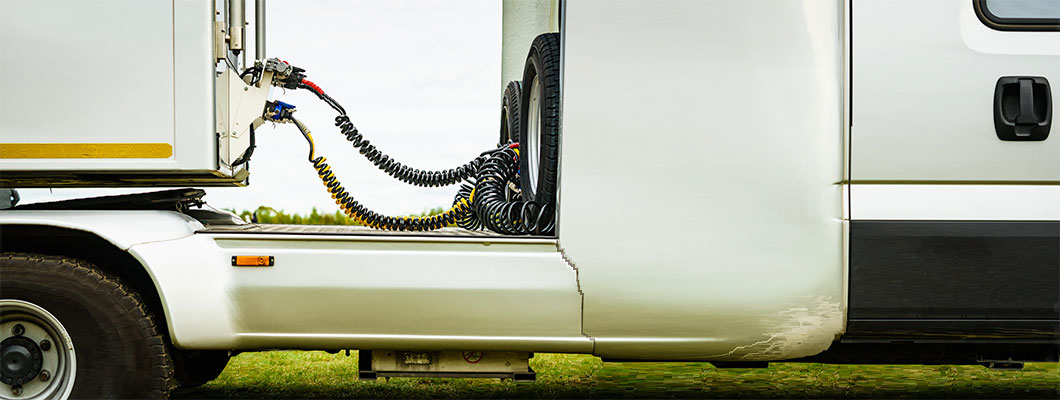Tractor Trailer Brakes
One of the most critical components in any vehicle is the braking system. Big vehicles require tractor air brakes, or air-powered brakes, to keep everyone on the road safe. This article will take an in-depth look at tractor brakes in big diesel vehicles and how they work.
Basics of Tractor Trailer Brakes
Tractor trailers are huge vehicles meant to carry heavy loads, so they need a braking system that will ensure they can stop easily and quickly. Unfortunately, the standard hydraulic braking system used in cars is not strong enough for the job and poses too many risks.
Instead of hydraulic brakes, tractor trailers have to rely on pneumatic brakes – or air brakes. Air brakes function in the opposite way that hydraulics do. They also take a few extra steps to engage. In the next section, we’ll discuss the inner workings of air brakes.
How Do Air Brakes Work?
So, how do air brakes work on a tractor trailer? Unlike the brakes you would find in your family car, air brakes work through a system of pneumatics rather than hydraulics. This means that instead of using hydraulic fluid or oil, the brakes operate using compressed air.
How A Tractor Trailer Brake System Functions
The compressor is a device situated on the engine that takes in and compresses air to be used in the pneumatic system. This air is then held in the air reservoir.
When the brake is applied, the air then passes through the triple-valve system and air lines to the brake cylinder. In the cylinder, the pressure forces the spring to compress and the brake mechanics to engage.
This system is backward in terms of how hydraulic systems work, in that if a hydraulic system were to leak and lose pressure, the brakes would be unable to engage. However, if the pressure drops too low in an air brake system, the emergency brakes come on, and the brake won’t disengage.
While this is much safer in the event of an emergency, the system is bulkier and more cumbersome than a hydraulic system. Hence, regular cars and smaller vehicles use hydraulic brakes. Additionally, as air brakes are often used on trucks carrying heavy loads, many drivers will employ engine braking to reduce wear on the brake pads and maintain better control over the vehicle.

Disc Brakes vs. Drum Brakes
So, we’ve gone over the basics of air brakes, but what are the differences between air brakes used with
disc brakes and
drum brakes? While these two types of air brakes function on the same principles, there are some subtle differences.
In the simplest terms, air brakes work by compressing and holding air to release the brakes and releasing air to apply the brakes. When disc brakes are used in conjunction with air brakes, they work as follows:
- Upon pressing the brake pedal, air passes from the reservoir, through the air lines, through the valve system, to the brake cylinder. In the brake chamber, the air pressure builds until it is strong enough to slide the caliper along the guide pins. The caliper moves a bridge that pushes the brake pad against the rotor. The connection between the brake pad and rotor causes friction, slowing the wheel’s rotation.
- When the brake pedal is released, a spring pushes the caliper and bridge back to their original positions. With nothing to hold the brake pad in place, it moves off the rotor and allows the wheel to spin freely.
In the case of a drum brake, the process is as follows:
- The brake pedal is pressed, and all the same air brake functions take place. In the brake cylinder, the pressure builds until it is strong enough to push the cam. The cam then rotates, bringing up rollers that push the shoe out against the drum. The friction between the shoe lining and the drum slows the wheel. When the brake pedal is released, springs pull the shoe back into place, releasing the wheel. In turn, the shoe’s return rotates the cam back to its original position.
- In short, air brakes work off of a system of building pressure, moving the air to force the brake mechanics and then releasing the pressure to let off the brakes. Thanks to the emergency brake, when there is no air pressure when the vehicle is off, or something goes wrong, the brakes will engage.
Tractor Brakes Not Working? Let Knott Brake Help
At Knott Brake, our No. 1 priority is providing customers with high-quality, premium performance brake products. For over 60 years, we’ve been working hard to offer customers custom brake design solutions with the best safety, reliability and performance in the industry. Have a question or need additional information about our selection of tractor trailer brakes and tractor air brake kits? Reach out today. Our brake design specialists will help you find the best tractor trailer brakes or custom-designed solutions for your brake system needs.
